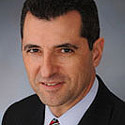02:03 PM
New Columbia Business School HFT Paper Is Disappointing
Even before reading a new academic paper on high frequency trading, the first thing we look for is who funded the paper. The next thing we look at is the bibliography section to see the types of sources the author has referenced.
Here is how our pre-read checklist for the new paper "What Do We Know About High Frequency Trading?" published by Professor Charles M. Jones of Columbia Business School went:
1) Funding: Paper was funded by a grant from Citadel LLC -- CHECK
2) References: Paper references other academic papers that were pro-HFT including Brogaard, Hendershott and Hasbrouck (PDF) -- CHECK
Now, we can properly adjust our mindset and begin reading what is expected to be a very pro-HFT piece. Professor Jones' paper is rather unique in that it doesn't have all the complicated mathematical formulas that you normally find in an academic paper on HFT. They are not there because Professor Jones' paper is a review of approximately 30 cherry picked HFT research papers. Reviewing the bibliography section is even more critical now.
We're not going to use this note to review the entire 55 page research paper from Professor Jones since much of the paper rehashes many other academic papers. The constant themes of the paper are summed up well in the press release that Columbia Business School issued for this paper:
-- "Overall, Jones found that HFT enhances market liquidity, reduces trading costs, and makes stock prices more efficient."
-- "The results of the research indicate that HFTs and related technologies are making markets better, not destabilizing them."
-- "Many HFT firms 'make markets' (or quote both a buy and a sell price for a security) using the same business model as traditional market makers"
-- "Those formulating policy should be especially careful not to reverse the liquidity improvements that we have experienced in the United States over the past few decades."
The four points that we pulled from the Columbia Business School press release are straight out of the HFT handbook. Any time you debate a HFTer, they will use these standard talking points: we add liquidity, reduce spreads, we are just market making evolved, we don't increase volatility, and regulators better be careful not to mess up our liquidity providing model.
Not only did Columbia Business School send out a press release on this paper, but Professor Jones released an a Politico op-ed last week. Politico is widely read by DC insiders (a key group that the HFT lobby has been trying to influence). While Politico has every right to publish any op-ed they want to, we felt that they should have at least disclosed the fact that Professor Jones' research paper was supported by a grant from Citadel LLC. We hope that Politico adds this key fact to the bottom of the op-ed. There are also some excellent comments in the comment section of the Politico article that we think are well worth reading.
Overall, we are very disappointed in Professor Jones and Columbia Business School for leaving out a key part of the story. While there was much cheer leading about adding liquidity and reducing spreads, there was barely any mention of the massive conflicts of interests in market structure that has allowed HFT to be so successful. Where was the discussion of order types that allow HFT's to queue? Where was the discussion of the enhanced information that HFT's receive in the exchange provided data feeds that allow them reengineer order flow? Where was the discussion of how the NYSE was fined $5 million for giving out information faster to their HFT clients? Where was the discussion of the enhanced rebates that HFT's receive from the exchanges that afford them guaranteed economics?
The paper strikes us as an attempt to possibly influence some key people that may be appointed to some new positions soon in Washington DC. It is the ultimate in "nothing to see here folks, move along" pieces of research. We recently wrote an open letter to Mary Jo White where we identified numerous pieces of research which tell a much different story than Professor Jones. Maybe Professor Jones can include some of that research in his next paper.
Joseph Saluzzi is partner, co-founder and co-head of equity trading of Themis Trading LLC, a leading independent agency brokerage firm that trades equities for institutional money managers and hedge funds. He is also the co-author of Broken Markets -- How High Frequency ... View Full Bio




















